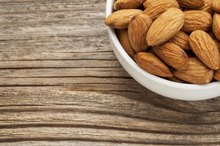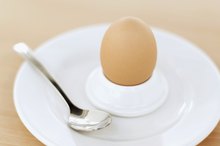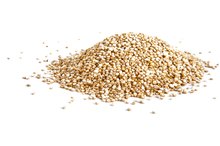A Vegetarian Diet for Getting High Fat and Protein
If you've cut meat out of your diet, you need a vegetarian diet that supplies the high fat and protein you need for proper nutrition. A purely vegetarian diet offers all the fat and protein you need and practically none of the saturated fat that clogs arteries. Additionally, eating a diet higher in fat and protein than in carbohydrates will help control your blood sugar and insulin levels, especially if you choose fat and protein sources high in fiber.
Protein
Acquiring protein solely from vegetable sources can substantially lower your caloric intake by reducing fat, but you won't get the complete amino acid profile that meat offers. The amino acid profile in protein determines how well your body will absorb protein for preserving muscle tissue and producing hormones and digestive enzymes. Vegetable protein sources such as soy and quinoa do offer a complete profile, according to Purdue University Department Horticulture Department. Combining other sources, such as nuts, beans, grains, fruits and vegetables, can help your body absorb more of the protein you eat. Nuts also offer an abundant supply of unsaturated fat, with walnuts providing one of the best sources of polyunsaturated omega-3 fat.
Fat
Sources of Low-Fat Protein
Learn More
Eat walnuts, ground flaxseeds and soybean oil for dietary omega-3, a type of polyunsaturated fat that your body can't make on its own but that it needs for optimal brain function. Avocados provide a rich supply of monounsaturated fat as well as fiber. Peanuts, olive oil and pumpkin seeds also provide monounsaturated fat, with peanuts providing a high amount of protein as well. According to the Harvard School of Public Health, a series of Dutch studies discovered that replacing dietary carbohydrates with unsaturated fats lowered levels of dangerous LDL cholesterol and raised healthy HDL cholesterol levels. Choosing a high-fat vegetarian diet can make you much healthier, provided you don't overeat.
Function
An added benefit of your high-fat and high-protein vegetable diet is the amount of fiber you'll be eating. Many of your plant-based protein sources, such as whole grains, legumes, fruits and vegetables, are rich sources of soluble and insoluble fiber. According to the Linus Pauling Institute at Oregon State University, certain types of fiber become fermented in the colon, releasing short-chain fatty acids that your body can actually use for energy. The soluble fiber in some of your protein sources, such as beans and oats, combined with your high intake of unsaturated fat, can keep your cardiovascular system in optimal health.
Considerations
Can Almonds Raise Your Cholesterol?
Learn More
Although choosing a vegetarian diet can make you much healthier, you'll need to arrange a dietary source of vitamin B-12, or cobalamin, a nutrient found only in meat. A B-12 deficiency can cause anemia, nerve damage and a host of cognitive difficulties. Take a B-12 supplement or buy fortified foods to avoid this nutrient deficiency. Your body stores B-12, so symptoms of a deficiency may not appear for several years after giving up meat. For vegetarians who still consume dairy products, milk and yogurt contain B-12 in addition to being a complete source of protein.
Related Articles
References
Writer Bio
Mike West has been helping people learn more about nutrition, weight loss and general good health since 2002. His writing has appeared in various web publications. He earned his bachelor's degree in journalism and received certification as both a personal trainer and a lifestyle and weight management consultant.









